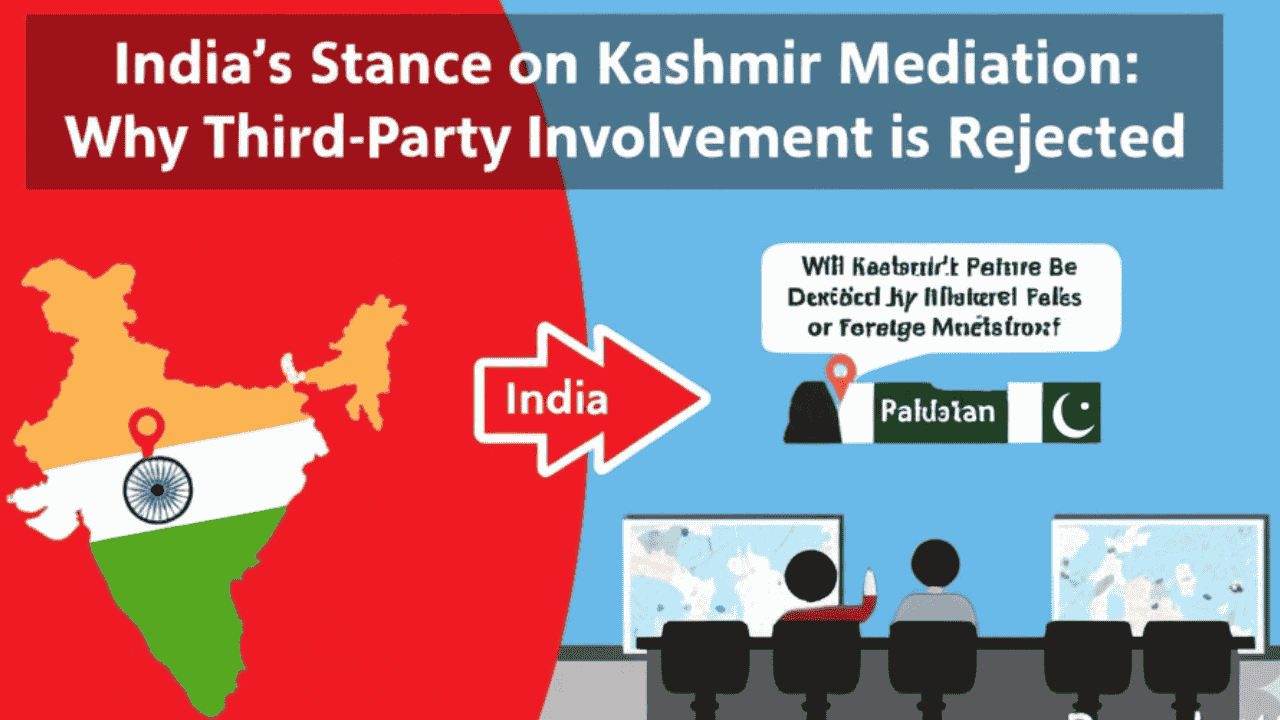The Roots of the Kashmir Dispute: Historical Lessons
The India-Pakistan Kashmir conflict dates back to 1947 when the princely state of Jammu and Kashmir, under Maharaja Hari Singh, was caught between two newly formed nations. India and Pakistan both laid claim to the territory, with Pakistan backing tribal militias that invaded Kashmir. This moment set the stage for the ongoing Kashmir territorial dispute. India’s reaction, rooted in the Kashmir sovereignty debate, was to secure the region through the Instrument of Accession, a decision that continues to shape India’s position on foreign mediation in Kashmir. The consequences of international mediation in Kashmir were felt early on when India took the dispute to the United Nations, a move that complicated its sovereignty claims.
India’s Diplomatic History on Kashmir: From Nehru to Present Day
From the early days of the conflict, India’s diplomatic relations with Pakistanhave been fraught with challenges. Nehru’s decision to take Kashmir to the United Nations in 1947, followed by the Shimla Agreement in 1972, marked critical turning points in India’s foreign policy regarding Kashmir. The Shimla Agreement impact on Kashmir dispute laid the foundation for India’s unwavering stance: no third-party involvement in Kashmir. This position remains in force to this day, despite Pakistan’s proposal for foreign mediation and the ongoing Kashmir insurgency. India’s rejection of UN’s role in Kashmir exemplifies its belief that bilateral dialogue, not international mediation, is the path forward.
Understanding the Shimla Agreement and Its Legacy
The Shimla Agreement, signed in 1972 after the Indo-Pakistani War, fundamentally altered the course of the Kashmir dispute. By committing both nations to resolve differences bilaterally, India rejected any form of third-party mediation in Kashmir. The agreement emphasized the importance of direct India-Pakistan bilateral talks to resolve the conflict, with no role for international actors. Even today, India remains steadfast in its position, holding the Shimla Agreement as a cornerstone of its foreign policy. This legacy continues to inform India’s diplomatic approach, as seen in the recent Pakistan Occupied Kashmir (PoK) tensions.
The Pahalgam Incident: A Wake-Up Call for Kashmir Policy
The tragic Pahalgam attack highlights the vulnerabilities of the region and the escalating cross-border conflict between India and Pakistan. Pakistan’s attempt to suggest foreign mediation in the aftermath reflects its ongoing strategy to involve international powers in the dispute. India, however, sees the incident as a stark reminder of the necessity for strong security measures and robust India’s military response. The attack underlines the dangers of compromising on India’s established policy against third-party involvement, especially in the face of Pakistan’s persistent efforts to internationalize the Kashmir sovereignty issue.
India’s Stance on Kashmir Mediation: Lessons from History in a Time of Rising Tensions
As tensions rise once again following the Pahalgam incident, the question arises: will India reconsider its stance on Kashmir mediation? History teaches that India’s rejection of UN’s role in Kashmir has been a consistent feature of its foreign policy. The country’s firm belief in resolving Kashmir’s territorial dispute bilaterally, through direct talks between India and Pakistan, is further reinforced by the Shimla Agreement. Any deviation from this path would contradict India’s commitment to bilateral diplomacy and undermine its position on Kashmir sovereignty. The recent increase in cross-border firing along the Line of Control (LoC) and escalating tensions in Pakistan Occupied Kashmir (PoK) only strengthens India’s resolve to keep mediation efforts out of the equation.
What Does Pakistan’s Offer Truly Mean?
In the aftermath of the Pahalgam incident, Pakistan’s proposal for third-party mediation came as no surprise, considering its ongoing efforts to gain international attention. However, India views this suggestion as part of Pakistan’s broader strategy to internationalize the dispute and deflect blame. India’s consistent refusal to accept mediation reflects its firm stance on the issue, which has been a key element of India’s diplomatic relations with Pakistan since the signing of the Shimla Agreement.

A Reminder of History: Why India Refuses Mediation
The historical context of the Kashmir dispute reveals why India remains resolute in its rejection of foreign mediation. From the mistakes made during Nehru’s time, such as taking Kashmir to the United Nations , to the Shimla Agreement of 1972, India has always prioritized bilateral dialogue over third-party involvement. The country’s Kashmir sovereignty remains non-negotiable, and no external actor can mediate this issue. India’s rejection of Pakistan’s proposal for foreign mediation underscores the principle that Kashmir is an integral part of India, and any international interference would undermine the country’s territorial integrity and sovereignty.
Conclusion: The Path Forward
In conclusion, the ongoing Kashmir insurgency, coupled with the Pahalgam attack and escalating tensions along the Line of Control (LoC), has brought the issue of mediation back into the spotlight. However, India’s historical experience with mediation—starting with the early years of the Kashmir dispute and continuing through the Shimla Agreement—has reinforced its steadfast position. The country’s commitment to resolving the issue through bilateral dialogue with Pakistan, and rejecting any form of third-party mediation in Kashmir, is unlikely to change. In the face of Pakistan’s persistent calls for external involvement, India remains focused on preserving its sovereignty and maintaining its position as the rightful sovereign of Kashmir.
